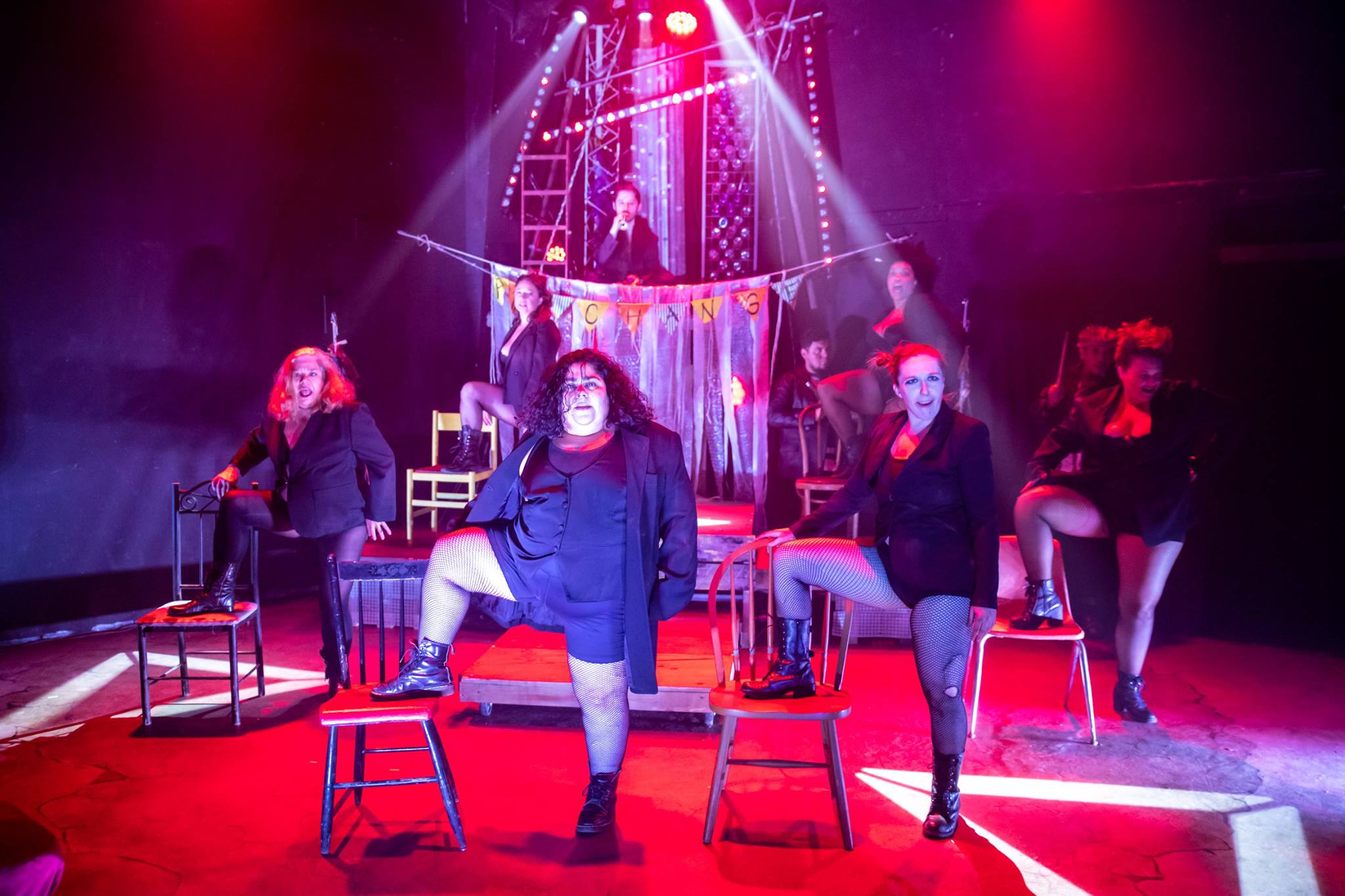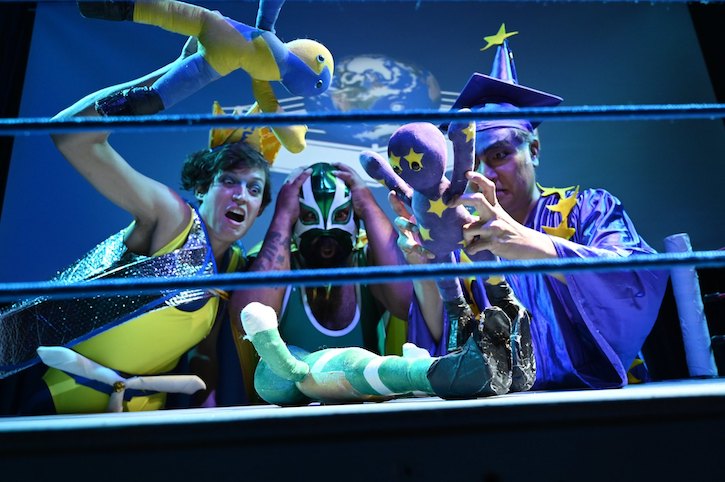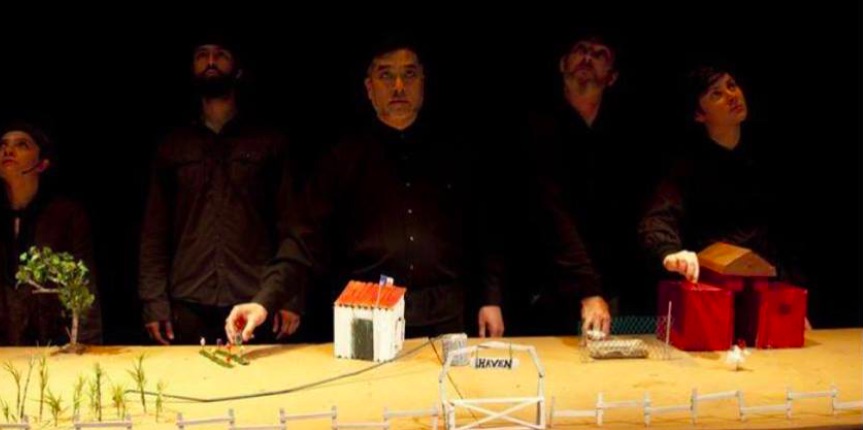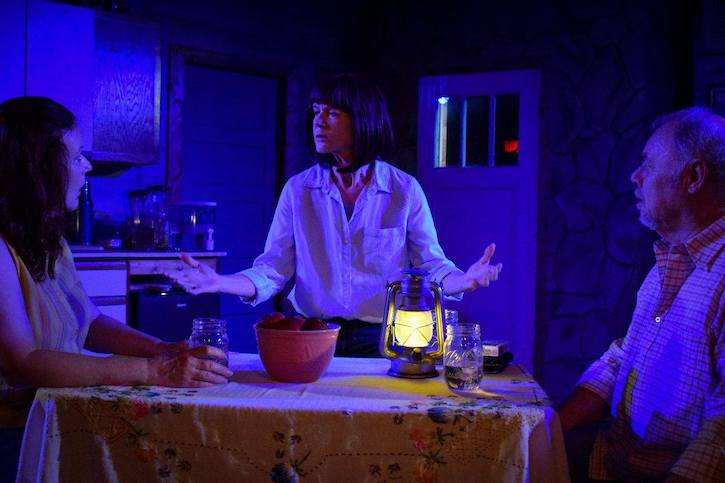Review: Screaming at the Apocalypse: Three Austin stage Works Looking at the Worst of the Near Future
by David Glen Robinson
Austin’s theatre industry is a well-knit community of fairly like-minded folks. They share ideas, coffee, work, and life. It's no surprise that common themes and concerns enter their stagework regularly. In this politically charged present, however, one theme seems pre-eminent. That theme is climate change and its effects. At one point in the spring of 2019, three productions overlapped one other in at least one weekend of the standard three-weekend run of stage productions. Each addressed the deterioration of the physical planet, each took its own approach.
These stage works care enough to speak out on climate change and its flirtation with human extinction. Speaking out has risen to a strident existential scream, a cri de coeur all around. It is with sadness that one must report that these sentient beings all seem to despair of life-affirming solutions. The inflections of their cries are well worth a listen.
Let me compare and contrast the Vortex Theatre’s LAST: An Extinction Comedy, Glass Half Full Theatre’s Once There Were Six Seasons: INTERACTIVE, and Jarrott Production’s The Children.

Last: An Extinction Comedy, directed by Rudy Ramirez, is just that: a dark, dark, take on the world after thecollapse, loaded with dirty jokes in a setting extending from Austin to Pflugerville and Georgetown. The show appeals heavily to those with appreciation for the wry and ironic, which is to say almost all adults. The show has a few memorable characters, and the entire cast turns hundreds of one-liners into abundant laughs. Their humor covers the spectrum from snicker to guffaw. It's a work devised by the large cast of street-savvy actors. In addition to cleverness, they are notable for advanced potty-mouth. The name of the barter shop run by the band of semi-nomads shall not be perpetuated here.
Last imagines a world with no water, money, or agriculture. One can think of it as a so-called dystopian tale, but it's so much more than a unit of that genre ghetto. The show is wisely aware it's the things we take for granted that are most at-risk from disruptive climate disturbances—particularly the failures that may not be that far off. Who needs a comet-strike? How about a prolonged drought with four Harvey-Rita-Katrina-type hurricanes? The show launches from realism but still gives us tropes from fantasy movies such as Mad Max, Soylent Green, and even The Wizard of Oz. We get laughs but are denied such comforting fantasies as aliens, zombies, vampires or replicants. The show offers only human beings dying and whistling their jokes past the graveyard.There's no hope anywhere -- an extraordinary view for a work devised by talented millenial actors in the full bloom of life.
If anyone think this is an accident of collective text writing, think again. Director Rudy Ramirez in his many works has made plenty of harsh statements about the world as it spins. The times call for writhing in despair; let others find workable solutions, they’ve been warned. Yet Director Ramirez is not quit of offering us gems: Bonnie Cullum tells her story of O as the character of the same name. In the Mad Max world O is a sexual victim as a girl, then a prostitute, and finally a transcendent prophet, all told in one award-worthy five-minute speech. Melissa Vogt plays Fire Ant, a horny lesbian cartoon character with a caricatured cowboy accent, who eventually sings a beautiful solo without dropping the accent. Last is unrelieved via negativa, but it is instructive for all (only adults are admitted).
* * *
Glass Half Full Theatre’s production of Once There Were Six Seasons: INTERACTIVE is simultaneously the least conventional of the three productions and the most scientific, rational, and full of hope. In a phrase, the company puts on puppet shows, but no single phrase captures their multi-scale puppetry or their multilayered stories. Especially off-grid is their full-scale Lucha Libre wrestling match as Part 2 of Once There Were Six Seasons: INTERACTIVE. In that, the black-clad puppeteers donned costumes and assumed WWE monikers associated with environmental issues. The giant ring match focused entirely on solutions to environmental collapse and destruction.

The heart of the show lay in Part 1, however, on mobile puppet stages, populated by 1/8 or 1/10 scale puppets—polar bears of fabric, birds of a single feather, and human beings of enfolded fabric or sticks and featureless tiny balls for heads. With these and other characters and a vast collective imagination, the puppeteers took us around a world—our world—into scenes of environmental decay stemming from global warming. These scenes ranged from melting ice caps, rising sea levels, nemesis tyhoons, failing wage-labor mines, human-induced droughts, and sprawling urban non-solutions. Notably apt for Texas residents, the puppeteers built a ranch on a table, and in a hallucinatory progression of images retold the economic history of ranchland Texas from pioneer claims to the end of open range to an oil industry leaving the desiccated land depopulated, a Mordor of insensate pumpjacks sucking the remaining life out of it.

All these images reveal much scholarly knowledge from the fields of ethnology, sociology, and climate science. Puppeteer and narrator Rommel Sulit said, “The climate has changed many times, and culture adapts to it. But when changes come too fast, culture cannot keep up.” Urbanization, wage-labor, and slave-caste poverty spell the end of many cultures. The cultural richness left behind is memorialized in Once There Were Six Seasons: INTERACTIVE by the brilliant and visually lyrical voyage of an ur-hero poling an outrigger canoe over a monstrous typhoon-churned ocean. This hero’s journey ends with his return to a destroyed village.
* * *
The Children is a new (2016) British play by Lucy Kirkwood, and it and the production given it by Jarrott Productions offer the quality and depth of thought we expect from contemporary UK plays. It is the most deeply introspective of these three plays. Its take on the modern apocalypse is found deep in the lives and life histories of three people, modern Britons who in all self-satisfaction never thought they would face such a vulgar end.
The action takes place inside an English seaside cottage, well designed for the production by director Carlo Lorenzo Garcia and Michael Krauss. The characters are Rose (played by Pamela Francesca Christian), Hazel (played by Katherine Schroeder), and Hazel’s husband Robin (played by David R. Jarrott). The three are various varieties of scientists or technicians, people who have designed, built, and operated a nuclear power plant, having learned all the lessons of Chernobyl and Fukushima. Of course the nuclear installation explodes, melts down, and spews radiation over half of England. To those who point out that this is not technically climate change: recognize that sleeting ionizing radiation can instantly, lethally change the climate of your immediate environment.

Many layers of this play peel back quickly to reveal the emotional entanglements of these characters over many years. This is by design and is a credit to Playwright Kirkwood. The unlayerings reveal three lifelike characters, Britons we might meet and with whom we might share a glass of wine and a yoga mat. But there are profound differences among them, and the times are extraordinary.
Rose is single, childless, amazingly brittle and insecure; and she had a long affair with Robin in their years at the power plant. She sees the prospect of her demise creeping over the horizon in the form of a bout with cancer. In the face of Britain’s apocalypse, she proposes to the others to volunteer to enter the power plant and effect a cold shutdown only the original designers could achieve. Of course, they would die quickly. Rose argues in favor of it, presenting the group with a chosen end, a rational end, one with the possibility of saving millions in one triumphant act. Unstated in the text is the expiation of the wrong committed by high science that led to the nuclear catastrophe in the first place.
The characters contemplate their ends in a nearly unique and individual confrontation. They see their environment is about to collapse and take them out with it. They may well die soon if they do nothing at the power plant; they may not succeed in shutting down the power plant and die anyway.
Hazel had been looking forward to a beneficial retirement, practicing yoga, supporting her four children with Robin, and fulfilling yoga’s Hindu-derived philosophy that the meaning of life is living it. Robin is a harder-edged materialistic scientist who can’t relate to his grown children when they call. He despairs and shows signs of physical breakdown. He favors Rose’s modest proposal at that time, commenting that bodies are “rented meat” anyway. Everything ends, it is great to have choice, and life is lived by ambulatory cells and tissues, so no big loss. This is a philosophy similar to that of 90s black-clad Goths who called human beings “meat machines” and were prone to suicide.
And so -- Rose fearfully sees saving the plant as a final act for the greater good; Hazel sees much to live for even in the face of destruction. And Robin, foreseeing his personal end, thinks it's probably a good time to let go. Robin's attitude suggests death as an escape from worse consequences left behind, and Hazel can’t seem to jolly him out of his fatalism.
Lucy Kirkwood presents us with options, a moral choice, and pretty close to a Greek tragedy. She doesn’t shield us from the glare. Jarrott Productions gives the play full honors. Carlo Lorenzo Garcia does yeoman work directing the dialog-heavy stage play and necessary close timing with props, etc. Dave Jarrott as Robin checks his golden radio voice at the door and puts on a very acceptable modern British accent as do the other actors in the all-American cast. More importantly, the actors don’t fall out of their accents in the later, more intense scenes.
* * *
These stage plays are featuredlofferings in the performance seasons of well-regarded Austin production companies. Other productions in the past year may also have addressed the issue of environmental destruction, but these three form a kind of astral conjunction of concern. All three transcend mere climate catastrophe and proceed to modern, updated eschatology. They declare an end, no hope there, and they look past the end to what comes next. Their divination is of the smoke rising from the rubble of civilization, scrying images in the billows and clouds.
Last sees a slow ratcheting down of population, a generation reduced to scavenging and starvation while groping toward stable tribal social forms. The road back will inevitably see the reemergence of feudalism.
Once There Were Six Seasons: INTERACTIVE by its very title sees the fall as having been coming for a very long time, but of the three shows, it holds out the greatest hope of forestalling or diverting another Great Extinction. Through clever performance, the creators of the show point its audience down pathways of change achievable by concerted human agency. Many poets have likened hope to an ember glowing in ashes; Glass Half Full Theatre, so auspiciously named, refuses merely to sit in the ruins, but breathes on the ember to keep it bright.
The Children is the least enamored of hope of the three productions; in fact, it offers no hope at all. Britain has for many years become an almost strictly secular society, a trend perhaps reversing with immigration from the Commonwealth, much of it by Muslims. The Children seems to evisage no secular solutions for human-induced cataclysm, and certainly no spiritual armament. Indeed, Kirkwood seems to say that destruction is what humanity deserves for this mess. The only gray area here is Hazel on her yoga mat. The practice is religious regardless of what non-religious practitioners insist. Yoga comes from Hinduism, a branch of it that seeks to unite body, mind, and spirit, at one with the larger cycles of the universe. Perhaps Hazel could bring all these sources of strength to bear on this world of dread, if not to resolve its dilemma, then at least to survive it. It is only the faintest glimmer of hope, not even an ember, but playwright Kirkwood clearly leaves us with it.
The allusion to ancient wisdom brings up other mental images insistently. Wiccan practices (nature-based religion) rely on meditation and trance for insight. The high priestess Starhawk leads one such trance meditation on “The Dream of the Butterfly.” The trance meditation is one of many, but its insights set humanity firmly within the cycles of nature and their encompassing beauty. Once set, collective decisionmaking cannot work in favor of more pollution.
Hats off to the Austin theatre community for the efforts described here; they help us stay true, so that the ember of hope may harden into a shining gem.
Scream at the Apocalypse
by various
more than one venue
Austin, TX, 78700
includes LAST, AN EXTINCTION COMEDY, THE CHILDREN, ONCE THERE WERE SIX SEASONS
